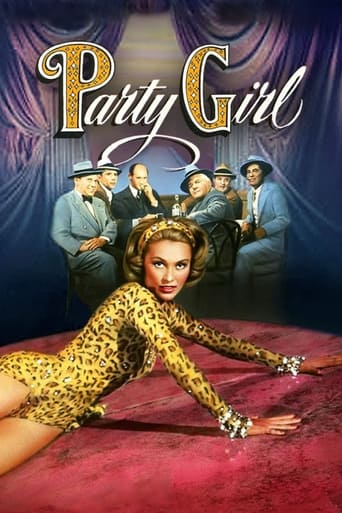masonfisk
Not to be confused w/the Parker Posey starrer from the 90's, this rare color noir from the 50's shot in widescreen & directed by Nicholas Ray concerns a mob lawyer finding love & vowing to try one more case & then head for the hills but his boss comes in the guise of Lee J. Cobb, who definitely won't take 'no' for an answer. With a rare dramatic turn by Cyd Charisse (she does dance here but there's definitely some meat on the bone part-wise) the tale has its share of crosses & double crosses but it really is entertaining as heck w/a great star turn by Robert Taylor who's all control & menace. Worth a look!
misctidsandbits
Having passed up this movie many times, I decided to check it out when it came up again on TCM recently. Now that you can tape something and scan through, it is easier to evaluate before you waste your time. Going through, I noticed Robert Taylor coming across better than I've ever seen him. He was the main deterrent before. I've never thought him good enough looking to put up with, especially when the main lead. But seeing Lee J. Cobb in it and really liking the deep color, I became interested. Also, have always liked Cyd Charisse's dramatic persona – generally smooth, no overstatement. Her musical numbers were rather enlarged for the type of film, but guess they couldn't resist. And, MGM could really come up with some odd titles.Taylor proved to be convincing and capable throughout. Enjoyed him and Charisse together and definitely the visual. Cobb seems to have been used a lot for the more gregarious type, like the crime boss here. I initially saw him in roles as the no nonsense good guy, and I think I prefer him as that. He played that very effectively in "The Virginian" television series. He was the strong guiding hand, somewhat a father figure, who could bring up the volume when needed and take care of any foolishness, with dispatch. His screen time as such was my favorite part of that interesting series.Hey, it's a Hollywood movie, which is going to have some form of the Hollywood treatment, both good and bad. If you can anticipate and accept any given film's set of excesses and idiosyncrasies, it's easier to enjoy what is enjoyable to you. This one is liberally laced with improbables, for one thing. Again, expect that and other unrealities from old Hollywood. It's the nature of the genre. I certainly prefer it to where they've gone now. For this one, I could ignore the improbables and move along with things. The relationship of Taylor and Charisse (and the quality of the visual) captured this movie out from the ranks of ones I would usually pass over.
MartinHafer
It's interesting that Robert Taylor's last film under his long MGM contract ended so well with this tough little movie. While "Party Girl" is filmed in color and lacks the gritty dark look and unusual film angles of film noir, it is a nice near-noir film. Taylor plays an attorney with no soul. He has spent his career working for the mob and doesn't mind working for scum--as it pays very well! However, when Taylor meets a dancing girl who turns out to be quite decent (Cyd Charisse), his amoral attitude is shaken and he wants to leave his lucrative practice and do something decent with his life. What makes this film is the excellent supporting cast working with Taylor (who, by the way, is quite good here). Lee J. Cobb is wonderful as the Al Capone-like mob boss and his henchmen (John Ireland, David Opatashu and Corey Allen) are all exceptional actors. Together, combined with a wonderful script and exceptional direction, it makes for a very good film indeed. Tough, cynical and a quality production throughout, this is a great swansong to his MGM career. The only deficits are the dancing numbers by Charisse and a mistake in the final scene where acid pours on Cobb's face but he's not the least bit burned. The dancing just wasn't necessary and tended to disrupt the dark tone of the film. By the way, if you like this film, try also watching John Garfield in "Force of Evil". Its plot is very similar and is also an exceptional film.
funkyfry
This film was made at a time when the classic "studio" system was in collapse, and journeyman genius Nicholas Ray -- who had previously made masterpieces like "In a Lonely Place" for Bogart's Santana Productions, "Johnny Guitar" for Republic Pictures, and a whole slew of top notch film noirs for RKO -- found himself highly employable but somewhat unable to get his own productions off the ground. As such, I think it's fair to describe the film less as a labor of love than a labor of discovering love, and you can almost see the process of Ray finding the secret of various scenes with his actors. It's a better film than any of his subsequent "epic" efforts that I've seen, and perhaps you could even say that in its rather simple story of a disabled mafia lawyer (Robert Taylor) who meets the love of his life (Cyd Charisse) at a tacky mob party the director found an opportunity to comment on the dissolute state of his life and career.The story follow's Taylor's character's attempts to extricate himself from his deep involvement with mafia kingpin Rico Angelo (Lee J. Cobb), who relies on his legal skills to keep him and his buddies -- including the opportunistic Louis (John Ireland) and sadistic, unstable Cookie La Motte (Corey Allen) -- out of prison. One of the things about the film that really interested me was that the DA (Kent Smith) is perhaps more unscrupulous and ambitious than any of the mafia figures. In one of the film's best dialog sequences and one that is most charged with Ray's signature style, we see the DA Stewart trying to convince Tommy (Taylor) to become a "fink." It's as if the two are back in the courtroom, where we first saw Stewart, but with only the audience as judge. Tommy acquits himself well in his own defense: "my expertise is in defending the guilty man, and you've made it your business to make the innocent man seem guilty." Stewart remonstrates him: "when are you going to get smart and play along?" Tommy has an answer for that too: "when are they going to start making you a Senator?" Stewart: "As soon as you start talking." What's fascinating about this scene, and also the scenes between Cobb's character and Taylor's, is the awareness of how a conversation can be like a battle, and in all cases between equal and respectful opponents.Tommy plays on his sincerity, even to the audience, while holding forth with the most insincere of ruses like his continual appeals to the sentiment associated with his "father's watch", which he actually orders in bulk to use as a courtroom prop. It kind of reminded me of Chris Nolan's "Dark Knight" in the way that each time he tells the story of the watch he gives a different version specific to whatever situation he's in at that point, but always involving his father and this idea of a "hardscrabble" upbringing in Chicago. There's a strong thread of nostalgia running through the film, which is itself set in the 1930s Chicago of director Ray's childhood. One of the most remarkable scenes in the film is when Tommy tells Vicki (Charisse) about the injury that made him lame, all while they stand next to the very bridge where it occurred.The film features exceptional performances by Taylor, Cobb and Ireland and the very best performance I've seen by Cyd Charisse. I was able to see it at the Castro Theater in SF as a commemoration of the passing of Ms. Charisse a few months ago, on a double bill with Minnelli's "The Band Wagon." Unfortunately a direct comparison such as that makes her musical sequences in "Party Girl" seem pretty half-baked. The songs and dances are not very imaginative, and are not integrated into the film in any interesting way. Nick Ray seems to be able to get more kinetic power and more of a musical sort of excitement out of the violent montage of mob killings that plays like a color operatic version of the meltdown in Hawks' "Scar Face." "Party Girl" deserves a better fate than its had so far -- it should be released on video so that movie fans can assess its unique contributions to the gangster genre that place it firmly between "Scar Face" and "The Godfather", and yet infused with the "noir" atmosphere that was Ray's expertise. For the director Ray, this was perhaps the last film in which he was able to tell a story based around small and intimate moments as opposed to the huge European productions he would soon become just a small part of himself.





